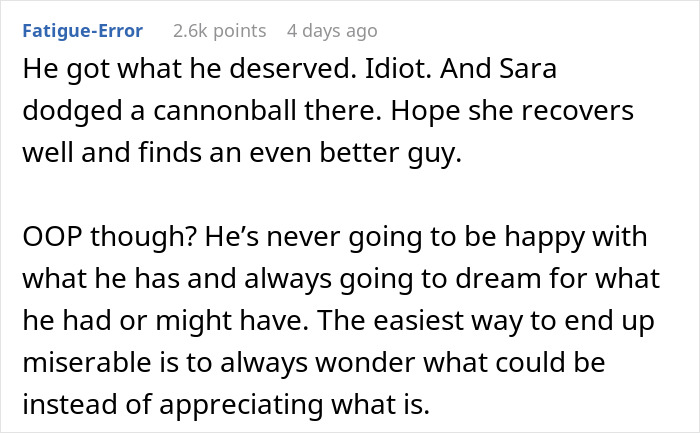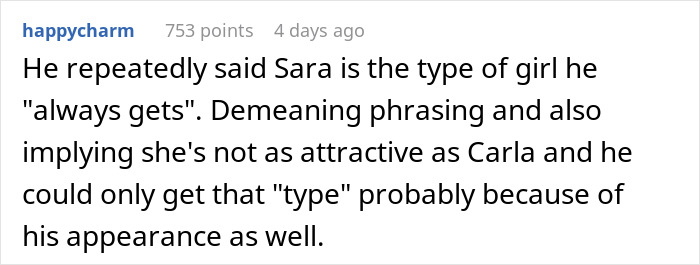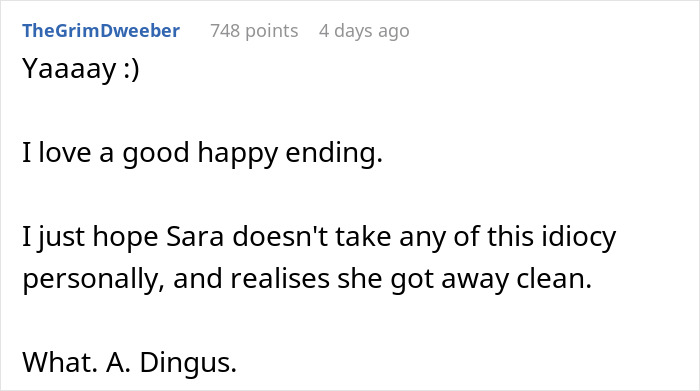FOMO is a phenomenon that’s not just for experiences and events. It can apply to relationships as well. More accurately, it’s FOBO, the fear of better options, that can ruin some romantic relationships beyond repair. Thinking that what we currently have with our partner isn’t enough and we might get it with someone else can lead straight to breakup land.
And this is exactly what happened to this man. He met his high school crush again after several years. The problem? He was already engaged. So, he asked the Internet what to do in this situation. Should he leave his fiancée and pursue his high school crush? Or should he forget her, get married, and live happily ever after? Read on to find out how people gave this guy a reality check.
FOBO (fear of better options), the evil brother of FOMO, can cause serious problems in relationships
Image credits: vadymvdrobot/Envato elements (not the actual photo)
This man faced a moral dilemma: to leave his fiancée for his high school crush or not?



Image credits: ELEVATE/Pexels (not the actual photo)
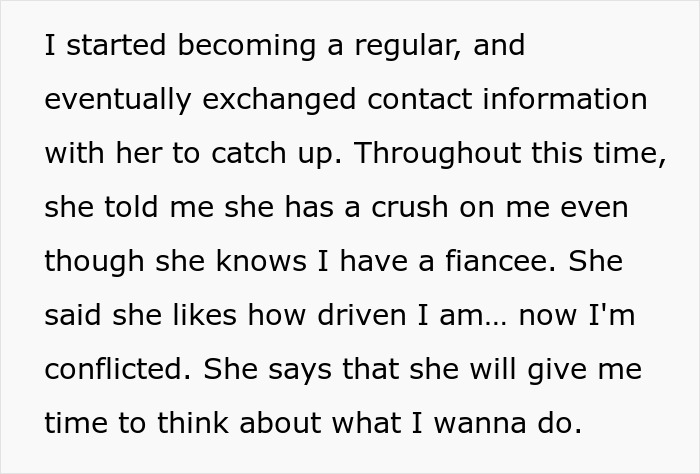
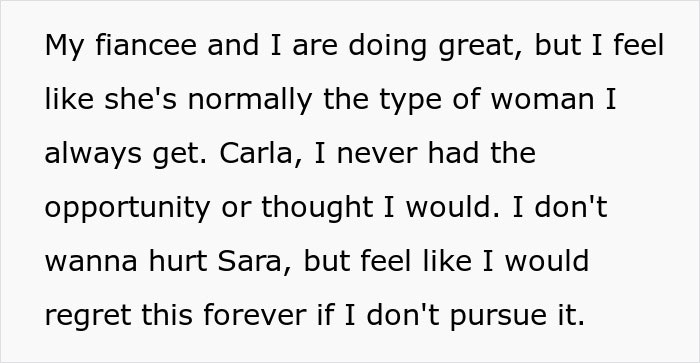
He later came with an update that was surprising to no one

Image credits: jm_video/Envato elements (not the actual photo)




Image credits: red_earaches
We always remember our high school crushes because they happen during our most formative years

Image credits: RDNE Stock project/Pexels (not the actual photo)
The OOP described how he was “doing great” with Sara, his fiancée. So why the switch-up? If you say you’re happy in your current relationship, why look for other options? Well, the first thing is that the guy ran into his longtime crush from high school. This is a classic case of ‘Old flames die hard.’
Psychotherapist Lori Gottlieb writes that when it comes to high school crushes and relationships, it’s most likely about a fantasy. “Fantasies reconnect us with aspects of ourselves that have been tamped down by the daily demands of work, kids, and our partner’s needs (the fantasy partner doesn’t have inconvenient needs).”
High school romances (or crushes, for that matter) can seem more intense because they happen at a formative age. It’s why so-called ‘first loves’ impact us more than subsequent relationships. According to cognitive behavioral coach for couples Dr. Robin Buckley, love is addicting because it triggers ‘feel good’ chemicals.
“Much like an addict’s first high from a gambling win or an addict’s first heroin high, we want to re-experience that ‘first time’ again,” she explained to Bustle. “This is one reason forgetting a first love is difficult. Our brains remember the neurochemical ‘high’ associated with it and want that experience back.”
For the OOP, his renewed flame for his high school crush is not so much about the woman, but about how he imagined her and how he felt at that time. Once he actually pursued her and found out what she really was like, the fantasy was dead. He describes how she only used him for his money and potentially even cheated.
Relationship FOMO should prompt us to seriously evaluate our current relationship

Image credits: Jasmine Carter/Pexels (not the actual photo)
Another aspect of this story is that the guy, even if engaged, was looking for something more than his current relationship. Relationship FOMO or FOBO can manifest themselves when one partner starts questioning a relationship even when there’s nothing particularly wrong with it.
Relationship experts recommend figuring out what exactly seems wrong. “If the relationship is meeting people’s core, emotional needs – love, comfort, feeling secure, feeling supported, engaging in lots of positive activities, then you do have to ask yourself the question: so what is actually missing?” relationship expert Dr. Gery Karantzas from Deakin University told ABC Australia. That entails figuring out whether your partner has any faults or if you just set the bar really high.
When people find themselves at a relationship crossroads, Theresa Herring, LMFT, advises asking yourself some questions. First, do your values differ too much? Does one partner want kids and the other doesn’t? If so, there might be a fundamental incompatibility.
Also, what does it take for you to want to work on this relationship? This one’s about understanding whether the things in your relationship that you don’t like are within or outside your control. For example, a partner’s behaviors are not something you can control. If you don’t see a way to work it out, it might be a dealbreaker.
The truth is that there’s no knowing if that other relationship will make you happy. It might just be the desire for something more exciting, which for the guy in this story, it probably was. Unfortunately, taking such risks as he did rarely pays off. Just like ‘Sara,’ the partner goes ahead and just moves on.
People in the comments gave the man a well-needed reality check

